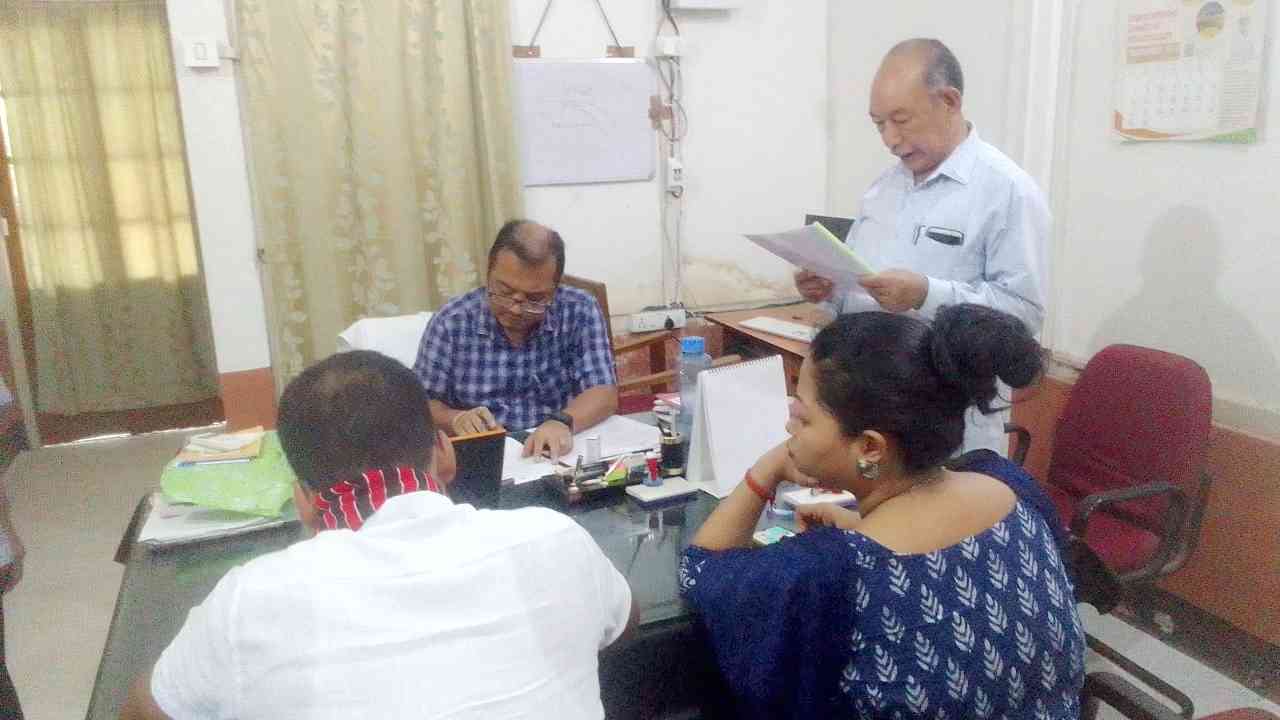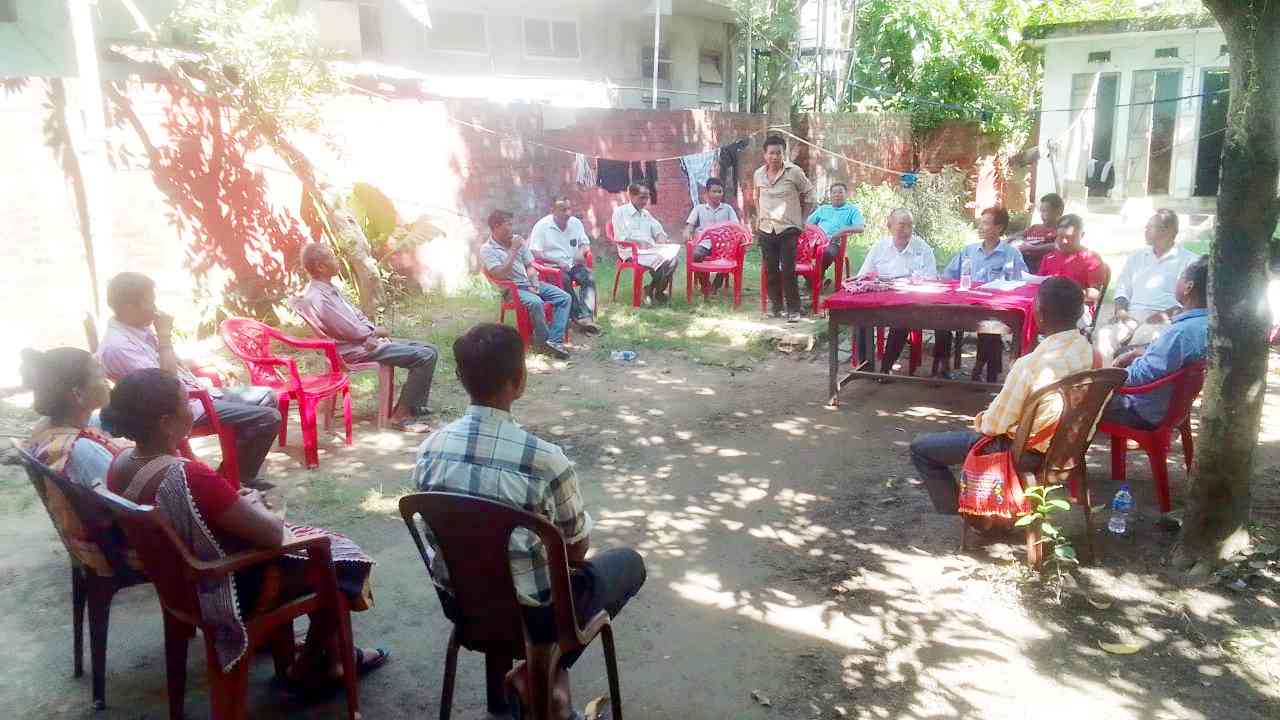KAKISS and AIARLA Protest in Karbi Anglong

The KARBI ANGLONG KISHAN SHRAMIK SHABHA (KAKISS) and AIARLA held a protest meeting on 23 September in Diphu town and submitted to the district commissioner a memorandum addressed to the President of India. This was taken up as part of the national campaign of AIARLA to highlight the most basic issues of rural and agrarian workers which are neglected by the Modi government in the centre. The delegation was comprised of KAKISS office bearers including Rabi Kumar Phangcho, Adviser, Longkiram Tokbi, President, Bikramsing Terang, General Secretary, Longki Phangcho, Working President and Gobin Tokbi.
The memorandum stated that the ever-increasing inequality and rising inflation in the country have made the lives of the poor, Dalits, tribals, scheme workers and all the working classes miserable. Our governments are constantly retreating from their constitutional duty of paying living wages to unorganised laborers and other workers including a large number of women, while social welfare and pro-poor schemes are constantly being slashed.
Major demands in the charter included 5 decimal land and a permanent dwelling for housing, the grant amount of Pradhan Mantri Awas Yojana be increased to 5 lakh rupees, no displacements of poor and no demolitions without alternative arrangements, guarantee of livelihood- 200 days of work for each worker in MNREGA and a daily wage of 600 rupees must be ensured, free water and electricity to every house of Dalit and poor, right to education and health, and, a monthly pension of 4000 rupees to all retired rural labourers, elderly and disabled people.
The memorandum also included other demands as follows:
The halted process of land reform should be reinitiated. The urban ceiling law should be implemented again. The actual cultivator should be provided with the land for farming so that the increasing landlessness in the country can be controlled.
The sharecropping law should be strictly implemented and a new law should be brought to guarantee the benefits of government schemes to sharecroppers.
The central and state governments should bring laws to implement the SC/ST sub-plan. The amount for the SC/ST development and welfare plan should be increased in the central budget.
The coverage of the Right to Food Act should be expanded. Along with rice, wheat and millet, pulses, oil, and spices should be included in the provisions.
The uniform school system should be brought. The children of the Dalit, poor should be guaranteed compulsory monthly scholarships and the provisioned enrollment of 25 percent of local poor children in private schools should be strictly followed. To re-establish basic health services, the government should build at least 2 PHCs in all the blocks of the country.
The PESA Act needs to be strictly implemented and corporate land looting, acquisition of forests and mining should be stopped. The Forest Rights Act should be strictly implemented and the interest of the people living in the forests and settled in forests should be served.
The government should take measures to stop the increasing attacks, murders and rapes on Dalits and deprived sections and put extra efforts to increase the rate of conviction. A system should be put in place to hold the police system accountable for such incidents.
The central government should create a uniform and equal pension system for retired workers, elderly and disabled people.
The central and state governments must increase the minimum wages. The central government's idea to divide the country into three categories and implement three different wage rates of the central minimum wage should be immediately put to an end and a uniform wage rate should be implemented across the country. NREGA workers should get daily wages based on minimum wages. Workers employed under central and state-sponsored schemes should be given at least 21 thousand monthly honorariums.
A law should be made to curb the oppression and looting of microfinance companies. Women working under the Jeevika Mission should be guaranteed a respectable remuneration!
Stop Forest Dwellers’ Evictions, Implement Forest Rights Act 2006. Indigenous people residing near the Kaziranga National Park (KNP) in Assam inside Karbi Anglong have been facing an apprehension of eviction in the name of Kaziranga National Park (KNP) extension which includes, Tiger project, Eco-sensitive zone, Elephant Corridor and Wildlife Sanctuary. The tribal people who have been dwelling in the forests since the time immemorial have been living in peaceful co-existence with the forest. This is unfortunate that the Government in the name of protecting natural resources and forests is undermining the fact that the tribal people are an inherent part of the forests. While tribals have a role in protecting and preserving forests they are not forced to live continuously under the threats of displacement. This is being done in violation of Forest Rights Act 2006 and must be stopped. Adivais’ relationship and peaceful coexistence with forests needs to be preserved to save forests. The Union Government must withdraw the anti-tribal move, and must follow the provisions of FRA 2006, so that the indigenous people who reside in the affected area can live free from such threats.

Charu Bhawan, U-90, Shakarpur, Delhi 110092
Phone: +91-11-42785864 | +91 9717274961 E-mail: info@cpiml.org

